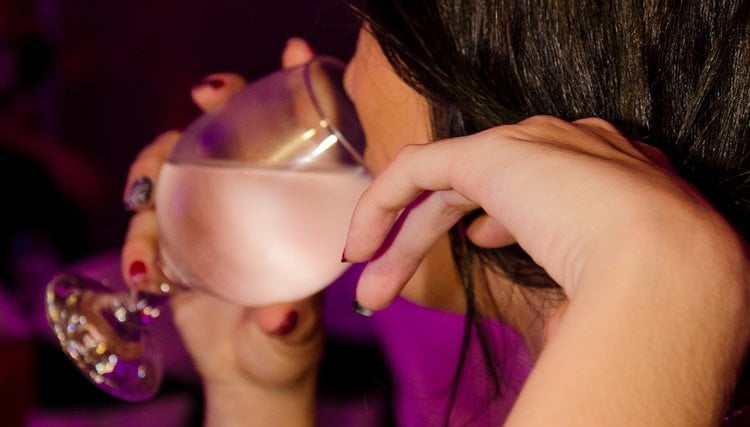Summary: According to new research, sipping a cold drink can reduce feelings of shame, guilt and embarrassment.
Source: Society for Consumer Psychology.
Have you ever felt embarrassed or guilty? A new study suggests that drinking a cup of cold water or iced tea could reduce these types of uncomfortable emotions.
Previous studies have shown a correlation between mental and physical states in humans; a sense of rejection, for example, can generate the sensation of feeling more cold. Researcher Jeff Rotman from Western University in Canada was interested in understanding whether regret was associated with a certain physical response in the body, and how this affected an individual’s choice of drink. The study findings are available online in the Journal of Consumer Psychology.
In one experiment, the researchers asked participants to remember a situation in which they regretted something that they had done (known as an action regret), and responses included things like sending an angry text. Another group of participants recalled something they regretted not doing (inaction regret), and responses included things such not pursing a college education. Then participants from both groups answered questions about the types of emotions they were feeling after recalling their regrets.
“Action regret led to increased self-conscious feelings of shame, embarrassment, guilt and remorse,” Rotman says. “These emotions have been linked to blushing, which is associated with feelings of warmth.”
Then the participants were presented with different warm and cold drinks, such as hot chocolate or coffee versus iced latte, ice cream or cold Gatorade. The people who were feeling shame and embarrassment were more likely to choose the colder drinks.
“While people were in the warm state as a result of feeling self-conscious emotions, they were motivated to cool off,” Rotman says. “We wondered if making people feel colder would help them feel less regret.”
To test this hypothesis, they asked participants to hypothetically invest in pharmaceutical stock. The stock value increased for some, but decreased for others. Afterwards, the participants viewed advertisements for either a Caribbean summer cruise or arctic Alaskan cruise. People felt less regret about bad stock decisions after viewing the Alaskan cruise advertisement.

“This provides evidence that emotions and temperature go hand in hand, and we can potentially use this information to regulate emotions,” Rotman says. “If you are feeling regret or shame, you are more likely to desire a glass of cold water, which could help you feel a little less shame. If you are in a warm environment and do something that you regret, you might feel worse about it than if you were in a colder environment.”
The findings also have implications for marketing. Companies selling something that might induce more regret, such as expensive clothes, might benefit from creating a colder store environment to help consumers feel less regret about purchasing the product, Rotman says.
Source: Heather Stringer – Society for Consumer Psychology
Image Source: NeuroscienceNews.com image is un the oublic domain.
Original Research: Full open access research for “The warmth of our regrets: Managing regret through physiological regulation and consumption” by Jeff D. Rotman, Seung Hwan (Mark) Lee, and Andrew W. Perkins in Journal of Consumer Psychology. Published online September 2 2016 doi:10.1016/j.jcps.2016.08.008
[cbtabs][cbtab title=”MLA”]Society for Consumer Psychology. “Feel Embarrassed? A Glass of Cold Water Could Reduce Uncomfortable Emotions.” NeuroscienceNews. NeuroscienceNews, 3 October 2016.
<https://neurosciencenews.com/water-emotion-psychology-5188/>.[/cbtab][cbtab title=”APA”]Society for Consumer Psychology. (2016, October 3). Feel Embarrassed? A Glass of Cold Water Could Reduce Uncomfortable Emotions. NeuroscienceNews. Retrieved October 3, 2016 from https://neurosciencenews.com/water-emotion-psychology-5188/[/cbtab][cbtab title=”Chicago”]Society for Consumer Psychology. “Feel Embarrassed? A Glass of Cold Water Could Reduce Uncomfortable Emotions.” https://neurosciencenews.com/water-emotion-psychology-5188/ (accessed October 3, 2016).[/cbtab][/cbtabs]
Abstract
The warmth of our regrets: Managing regret through physiological regulation and consumption
This research suggests that experiencing action regret induces a change in psychological and physical warmth, motivating individuals to ameliorate that change via interaction with objects that are perceived to be physically or psychologically opposite in temperature. Experiment 1 revealed individuals experiencing action regret felt more self-conscious emotions, and subsequently preferred cold (versus hot) drinks. Experiment 2 replicated this effect and ruled out arousal as a possible alternative explanation. Experiment 3 furthered this link by demonstrating that those feeling more self-conscious emotions felt warmer and subsequently preferred cold (versus hot) drinks. Finally, experiment 4 found that advertisements manipulated for temperature (e.g., cold climate) mitigated the psychological effects of action regret. We interpret the results of these four studies within the emerging field of embodied cognition, which argues that our understanding of emotional concepts is grounded in, and can be influenced by, physical experiences.
“The warmth of our regrets: Managing regret through physiological regulation and consumption” by Jeff D. Rotman, Seung Hwan (Mark) Lee, and Andrew W. Perkins in Journal of Consumer Psychology. Published online September 2 2016 doi:10.1016/j.jcps.2016.08.008






